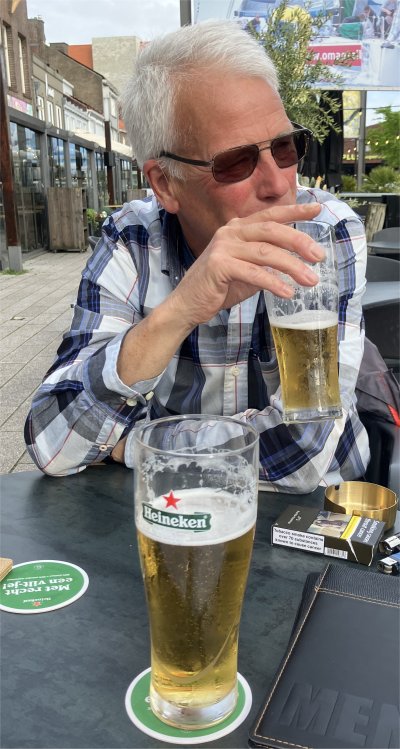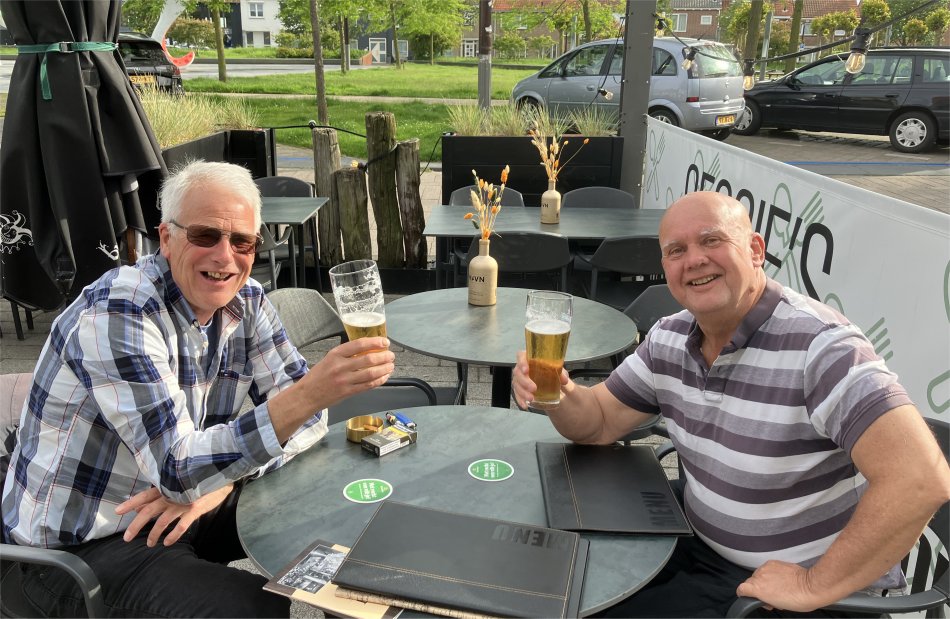Many large ships were sailing up and down the Scheur Channel, a navigation channel northeast of the harbour of Zeebrugge, that runs parallel to and just off the Belgian/Dutch coast. Unbeknown to the crews of these leviathans, over the past few decades, Dutch fishermen have dredged up large amounts of unique prehistoric palaeontological material in this area. The large number of walrus bones from the last ice age (116,000-12,000 years ago) is striking. The excellent state of the bones and the find of both males, females and young animals indicate that a large colony must have lived here, possibly the most southern walrus colony in the world. In the same area also a number of vertebrae from ancient whales were dredged up, dating from the Middle Eocene (roughly 43 million years ago). Remains of these primitive marine mammals are very rare in NW Europe (only three known sites in the North Sea). The unusual size of the vertebrae (width c. 30 cm) could suggest a hitherto undiscovered species of the family Protocetidae.
Meanwhile two floating fossils were hugging the southern edge of the Scheur Channel. The tide was turning against us, and we were soon crawling along at only 2 knots, definitely sub-walrus pace. But we persevered, and by 8am we were creeping into the marina at Breskens.
The harbour master was extremely efficient there. He knew who I was, the boat details, and Rex's inside leg measurements as soon as I entered. He had all that information from our brief visit to Breskens on 12/13th September 2022 (that was an aborted trip to Antwerp, which turned out to be Tollesbury > Breskens > Tollesbury in 48 hours due to gale warnings). Payment was painless, and the staff would call the Marechaussee for us in order to get our passports stamped.
In a very short time, we were helping a couple of Belgian chaps with their electrics; their battery charger was not getting power to charge with. By using parts of our kit, we were able to isolate their problems down to a faulty connector and a problematic power source on their pontoon. The guys were delighted with the successful identification of the faults, and insisted on giving us a couple of cans of beer. We found it hard to refuse their hospitality. The two were heading off to Denmark, where, after a week, the crew would return back to Belgium, and be replaced by the skipper's wife who intended to drive to wherever they reached.
I had a brief chat with a fellow off a boat from Ipswich. The two mariners on the boat had sailed from Ipswich to Scheveningen, then down to Breskens, and were about to sail off back to Ipswich. I wished him safe journey and off he went to cast off.
While waiting for the Marechaussee to turn up, Rex and I cleared out the windlass locker. A bird had actually nested in there! It was a useful exercise, I discovered that water entering that locker, be it rain water or crashing waves, actually drains out into the sea via the underside of a metallic plate on the bow. However, I could not see where water entering into the chain locker via the windlass was finding its way out into the marina.
The two young Marechaussee men appeared at 11:30. They were jovial and chatty, but we could tell that they had been trained to quickly weigh us up as soon as they came on board. The standard collection of boat details was followed by the usual interrogation: where do we intend to visit, how long for etc. Finally, after stamping our passports, they warned us of sailors being approached by strangers in smaller harbours and marinas, with the intention of "encouraging" sailors to transport other "parties" in their vessels. We were asked to inform the border control police immediately if this ever occurred to us. The chaps then wished us a safe voyage and left contented; their job well done.
We then diverted our efforts to lifting every floor board in order to mop up all the water in the bilges that we could reach. We ascertained that water accumulated in the chain locker would be automatically fed into the bilges. That explained why mud and sea water brought up by the anchor chain was finding its way into the bilges. We wouldn't be using the anchor chain again in the near future, so we decided to continue monitoring the bilges to check water was not gaining entry via the depth and speed-through-water paddle sensors, and possibly via one or more keel bolts.
While conducting this operation, and tidying up the resulting mess in the cockpit, a short, elderly man bounded alongside Duonita.
"Have you got a dog?" he chirped.
"No, I haven't", was my curt reply. Why couldn't he see we were busy.
"I have," he beamed at me. 'Bully for you', I thought, 'just don't bring it near me, I'm allergic to them'.
"Do you know if we can take our dog with us to England on our boat?" he inquired.
"I do know that if you fly with your pet into the UK, the pet needs to go into quarantine. Have you checked on the internet?"
"Yes, but I get conflicting answers. Some say I can bring my dog in; others say I can't. One site said we could only bring our dog across via ferry; the ferry terminal would have the correct procedures to cater for the pet."
Rex emerged from the bowels of Duonita, and he recommended the chap consult the UK government website. Indeed, he went further than that and accessed the website via his phone. It appeared that dogs needed to be chipped, have a health certificate, a pet passport and to have been inoculated against rabies. However, dogs entering the UK from Ireland were exempt. Now there was a possible solution, but a bit overkill.
We apologised to the man informing him that the cards were stacked against him. He gave a shrug of acceptance, and departed with a disappointed smile. The couple departed with their dog; mooring lines left scattered across the pontoons.
By 3pm, it was an overcast day with the sun occasionally poking through to terra firma. It is warm, the heat feeling good on tired skin. Rex snored himself into oblivion.
In the evening, suitably showered and made presentable, we were ready to explore the world of Breskens. Breskens is situated behind a line of dunes. With its fishing harbour, marina and fine fish restaurants, this is the maritime resort of Zeeland-Flanders. On the sea wall of a sweeping beach is the oldest remaining cast-iron lighthouse in the Netherlands: the Nieuwe Sluis lighthouse. It was built in 1867 and became a monument in 1982.
 Rex Sampling the Nectar |
On 14th May 1940, with the German army approaching, the Dutch government fled to London. Queen Wilhelmina initially ordered the British captain removing her from The Hague to set sail for Breskens from where she wished to lead the resistance against the invading armies. One of the reasons was that Breskens, having two fortresses in the vicinity, could be well defended. She was advised by the captain that he was under orders not to make contact with the Dutch shore as it was under heavy air attack, so Wilhelmina took the decision reluctantly to go to Britain, planning to return as soon as possible.
On 11th September 1944, during, Operation Switchback, the town was carpet-bombed by Allied forces, leaving very little of the historical centre intact. After the war, the town was rebuilt and became a centre for the Dutch fish industry and other maritime-related businesses.
In the nineties, with the fish-industry in terminal decline, tourism became the main economic focus and a number of high-rise apartment blocks were built on the waterfront.
A ferry connection exists between Breskens and Vlissingen. After the opening of the Western Scheldt Tunnel near Terneuzen in 2003, the ferry now only carries pedestrian and bicycle traffic.
We sauntered across to the Spuiplein in the town, and eyed up the collection of eating establishments that surrounded the patch of park, paved area and play area that served as the square. A family emerged from Restaurant Gerrie's, and they thoroughly recommended it.
I jokingly asked, "Do we get discount if we mention your name?", and, "Are you the owners or friends of the owners?"
They laughed back, explaining, "No, we live over there just 50m away. It really is the best food in town."
We took them at their word. The first beer was nectar, and whilst sipping our beers we discussed travel options. Our delay in departing the UK meant that tides on the Westerschelde would be against us traveling up to Antwerp. We could get a train up to the city though. Another option would be to head across to Middelburg; I hadn't been there since 2014. We eventually homed in on perhaps heading up through Middelburg, and catch a train from elsewhere across to Antwerp. We agreed that plan of action.
Rex's prawn croquette starter was excellent, and his main course of cod with a medley of vegetables including one item that the chef came out to describe as a special plant found by the sea in certain areas, which Rex found had a unique piquant flavour. For starters I had carpaccio with Noordzeekaas, a special cheese matured next to the North Sea, which really was delicious, followed by prawns in a subtle Thai sauce. The food was a tad expensive, but really excellent, as was the service.
A cool wind piped up on our way back to the boat. However, on board, a few hillarious sketches from Peter Cook and Dudley Moore soon thawed us out.
We were utterly shattered having had minimal sleep over the last two days. By 10pm we were in our bunks.
 Cheers from Breskens |
